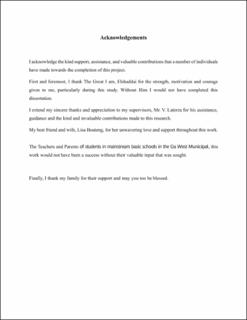INCLUDING STUDENTS WITH HEARING DIFFICULTIES IN GHANAIAN MAINSTREAM EDUCATIONAL INSTITUTIONS
Master thesis
Permanent lenke
https://hdl.handle.net/11250/3116253Utgivelsesdato
2023Metadata
Vis full innførselSamlinger
Sammendrag
Abstract
The purpose of the study was to assess the success of inclusive education for children withhearing difficulties in Ghanaian mainstream education. The study was guided by the followingthree objectives: firstly, identify the attitude of stakeholders towards the inclusion of children withhearing difficulties. The second objective was to investigate the resource adequacy ofeducational institutions in terms of the inclusion of children with hearing difficulties. Lastly, todetermine the appropriateness of the curricula in Ghanaian mainstream educational institutionsfor the needs of hearing-impaired children in inclusive education. Qualitative research was usedon the study sample of 16 participants (8 teachers and 8 parents). Convenience samplingtechnique was used. Semi-structured interviews and secondary sources of data were adopted asdata collection techniques. The findings of the study indicate that public and private schoolteachers as well as parents recognize the importance of inclusive education, aligning with theglobal consensus on the benefits of inclusion. All the respondents raised concerns about itspracticality or collective impact. In addition, the study found out that parents and teachers hadnegative responses to the resource adequacy of mainstream schools in Ghana. Lastly, all teachersfelt that the stipulated curriculum for the Ghana Education Service had to be improved to ensurethe successful inclusion of students with hearing difficulties. On the other hand, parents wereunsure about the nature of the school’s curriculum. Based on the findings of the study,itrecommends improvements of resources (hard and soft resources), support of special needsschools, a flexible education curriculum, and improved supervision.
